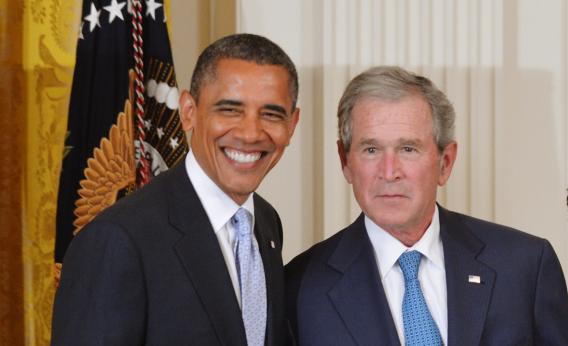Last night, in a confrontation over Libya, President Obama beat the stuffing out of Mitt Romney. Liberals are ecstatic. They shouldn’t be. Obama’s response to the Libya question was a carbon copy of George W. Bush’s response to questions about Iraq in 2004. Democrats have learned the cynical art of turning patriotism against dissent.
An hour into the town hall debate, a voter said he’d seen “reports that the State Department refused extra security for our embassy in Benghazi, Libya, prior to the attacks that killed four Americans.” He asked Obama: “Who was it that denied enhanced security, and why?” Obama didn’t answer the question. Here’s what the president said instead:
1. I’m the one who greets the coffins. “Nobody is more concerned about their safety and security than I am,” said Obama. “These are my folks, and I’m the one who has to greet those coffins when they come home. … I was there greeting the caskets coming into Andrews Air Force Base and grieving with the families.”
2. Trust me, because I say so. “When I say that we are going to find out exactly what happened, everybody will be held accountable,” said Obama. “You know that I mean what I say.”
3. What’s important is retaliation. “We are going to find out who did this, and we’re going to hunt them down, because one of the things that I’ve said throughout my presidency is when folks mess with Americans, we go after them.”
4. I’m taking it to the enemy. “I said that we’d go after al-Qaida and Bin Laden. We have.”
5. Right or wrong, I’m resolute. “Not everybody agrees with some of the decisions I’ve made. But when it comes to our national security, I mean what I say.”
6. Questioning my veracity is offensive. “The suggestion that anybody in my team … would play politics or mislead when we’ve lost four of our own, governor, is offensive. That’s not what we do. That’s not what I do as president, that’s not what I do as commander-in-chief.”
7. My opponent is playing politics with national security. “While we were still dealing with our diplomats being threatened, Gov. Romney put out a press release, trying to make political points. And that’s not how a commander-in-chief operates. You don’t turn national security into a political issue.”
In 2004, Bush used the same ploys. He milked the symbolism of flags, coffins, and Andrews Air Force Base. To paper over his failures as a manager, he ran as a warrior and avenger. He vouched for his own reliability. He substituted confidence for evidence, resolve for judgment. He argued that he was clear and honest, even if you disagreed with him. He used indignation and emotional appeals to drown out questions. When critics dissented, he accused them of dividing the country and undermining national security.
In the 2004 presidential debates, when the Democratic nominee, Sen. John Kerry, criticized the Patriot Act, Bush said Kerry was “for weakening it.” When Kerry called the Iraq war a mistake, Bush rebuked him: “That’s not a message a commander-in-chief gives.” When Kerry challenged Bush’s war strategy, Bush accused him of lacking “resolve.” When Kerry opposed an $87 billion war appropriation bill because Republicans refused to pay for it by reducing Bush’s tax cuts, Bush and Vice President Dick Cheney said Kerry and his running mate had “voted against supporting the troops.” When Kerry criticized Bush for going to war without U.N. support, Bush and Cheney said he “denigrates the contributions of these brave [allied] soldiers.”
In the eight years since then, Democrats haven’t learned how to beat Bush’s tactics. What they’ve learned instead is how to mimic them. “There were very important moments in the discussion about Libya,” Obama adviser David Plouffe told CNN last night. “Gov. Romney looked like someone playing politics, and I think the president looked like a resolute commander-in-chief.” On MSNBC, Obama strategist David Axelrod said the president “is aware every single moment that he’s responsible for the lives of the Americans he sends overseas. … He feels that intensely. So it is offensive, the suggestion that somehow he would play politics with this issue.” Today on Good Morning America, Vice President Biden added:
It became so clear to the American people how Gov. Romney and the campaign continue to try to politicize a tragedy. … The president was clear: We are going to get to the bottom of this. The whole world will know it. And I think when the president turned and looked at Gov. Romney and made that assertion, saying, basically, “Don’t question me on this, in terms of my caring,” I thought it was a powerful moment.
Powerful indeed. Rachel Maddow, who has written a whole book on war and its political exploitation, said Obama’s “strongest moment of the debate” was “when he called Mr. Romney offensive, when he was being incredibly serious and incredibly sober on the issue of national security.” CNN’s Anderson Cooper noted that the network’s dial group of undecided voters “went way up just in the strength of his response.”
Congratulations, liberals. You’ve learned Bush’s methods well. They’re great for winning elections. They’re just bad for governing wisely and holding presidents accountable. And now they’re yours.
William Saletan’s latest short takes on the news, via Twitter:
